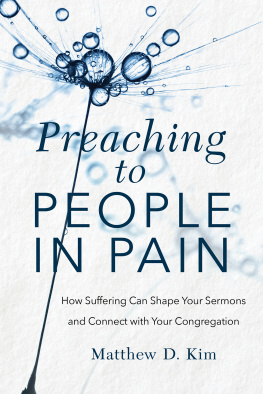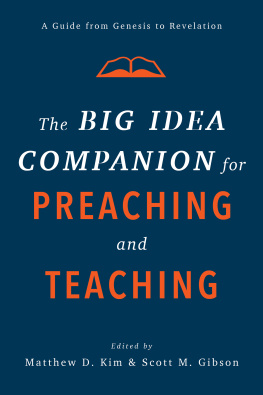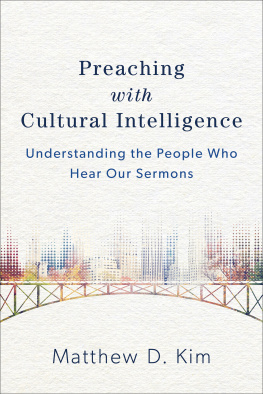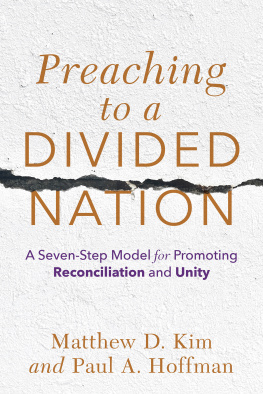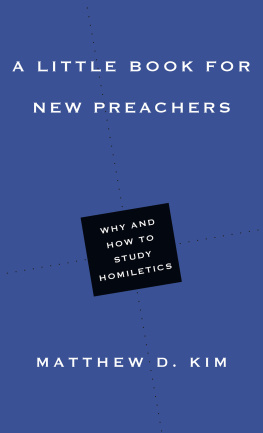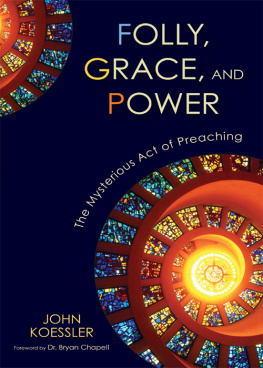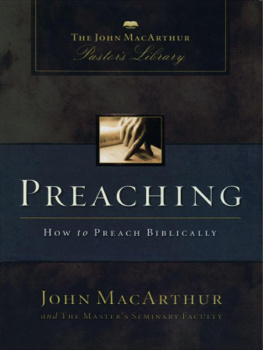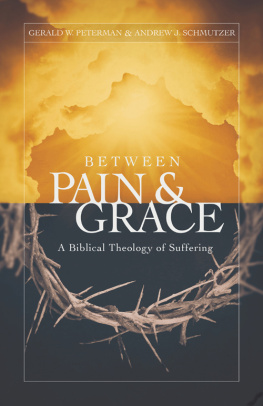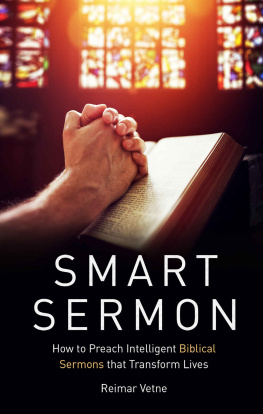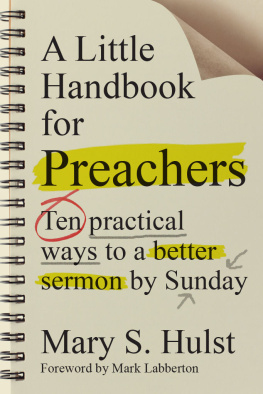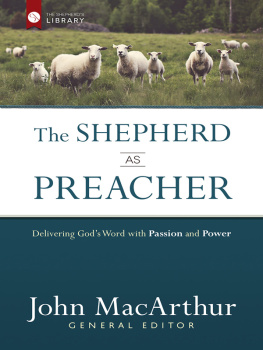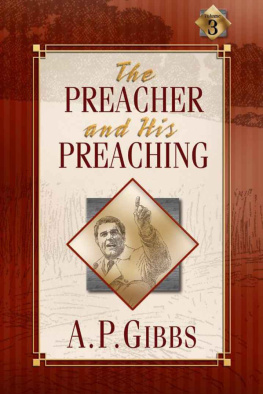Endorsements
Frederick Buechner famously wrote that the preacher should not be like the captain of a ship who is the only one aboard who... does not know that the waves are twenty feet high. Preaching to pain clearly indicates that we understand that there are waves. Confessing our own pain as part of that process indicates that we have had to navigate the waves too. Matthew Kim addresses the waves and rides them with his readers to teach us all how to navigate lifes storms by the light of our Saviors heart.
Bryan Chapell , pastor emeritus, Grace Presbyterian Church; president emeritus, Covenant Seminary; author of Christ-Centered Preaching
Our congregations need not only truthful exegesis and engaging preaching but also emotional discipleship. Each week, the people in our pews carry with them loss, grief, and suffering, and they long for a way to meet God in the midst of their struggles. When sermons focus only on the victory of the Christian life, this makes walking the way of Jesus more difficult for those who are in pain. Kim helps those of us who preach to address various types of suffering with wisdom, compassion, and the hope of Christ. He helps us take up the holy responsibility of proclaiming that every part of our livesincluding our sorrow and painis something that we address as a church and is, more importantly, a place to encounter God.
Tish Harrison Warren , Anglican priest; author of Liturgy of the Ordinary and Prayer in the Night
Matthew Kim, an experienced pastor, preacher, and teacher of preaching, has written an insightful and beautifully instructive book on preaching to people who experience painon all sorts of levels. Kim deftly demonstrates the preachers responsibility to understand his or her own personal pain and the pain of his or her listeners. As a result, the preacher is enabled to empathize with them and out of her own pain preach the hope of the Scriptures to them. Preaching to People in Pain is an important contribution to pastoral ministry, to preaching, and to the field of homiletics. Kim is to be commended for addressing this tender and fragile but often overlooked aspect of the preaching task.
Scott M. Gibson , professor of preaching, David E. Garland Chair of Preaching, and director of the PhD program in preaching, Truett Seminary, Baylor University
Preaching to People in Pain could also be called Preaching to Humans . In a culture which makes us believe something is wrong with us when we experience suffering, preachers have a choice: to provide shallow promises or to trust in the truth of our storythat resurrection only comes after death. With wisdom and courage Matthew Kim invites preachers to name their own pain for the sake of their own health and the health of their congregations. Were presented with the hopeful possibility that together we have the capacity for the challenges of life and that as we face them, we find the truth of our story in solidarity with our suffering (and resurrected) Lord.
Mandy Smith , pastor and author of The Vulnerable Pastor and Unfettered: Imagining a Childlike Faith beyond the Baggage of Western Culture
Title Page
Copyright Page
2021 by Matthew D. Kim
Published by Baker Academic
a division of Baker Publishing Group
PO Box 6287, Grand Rapids, MI 49516-6287
www.bakeracademic.com
Ebook edition created 2021
All rights reserved. No part of this publication may be reproduced, stored in a retrieval system, or transmitted in any form or by any meansfor example, electronic, photocopy, recordingwithout the prior written permission of the publisher. The only exception is brief quotations in printed reviews.
Library of Congress Cataloging-in-Publication Data is on file at the Library of Congress, Washington, DC.
ISBN 978-1-4934-3086-4
Unless otherwise indicated, Scripture quotations are from THE HOLY BIBLE, NEW INTERNATIONAL VERSION, NIV Copyright 1973, 1978, 1984, 2011 by Biblica, Inc. Used by permission. All rights reserved worldwide.
Dedication
To my wonderful parents-in-law,
Dr. Chung Hyun Oh and Mrs. Jung Sook Oh
Contents
Cover
Endorsements
Title Page
Copyright Page
Dedication
Acknowledgments
Introduction
Part 1: Naming the Pain
1. The Preachers Pain
2. The Listeners Pain
3. A Plan for Preaching on Pain
Part 2: Preaching on Pain
4. Painful Decisions
The Anatomy of a Bad Decision (Sermon on 1 Samuel 15)
5. Painful Finances
The Secret to Contentment (Sermon on Philippians 4:1020)
6. Painful Health Issues
Panhandling for True Satisfaction (Sermon on Acts 3:110)
7. Painful Losses
Successful Suffering (Sermon on 2 Corinthians 1:311)
8. Painful Relationships
Honoring Mom as Honoring God (Sermon on Ruth 14)
The God of Fourth Chances (Sermon on John 21:1525)
Conclusion
Appendix: Worksheet for Understanding Pain
Scripture Index
Subject Index
Back Cover
Acknowledgments
This book arose out of witnessing the weekly pain and suffering of broken parishioners and making sense of my own pain as a disciple of Jesus, pastor, preacher, and teacher. In writing this book, I wish to mention several individuals who have helped me along the way.
First, I give thanks for the pastors who filled out a survey on preaching to people in pain. You know who you are, and Im grateful for your continued friendship, partnership, and insights on this subject.
Im grateful to Gordon-Conwell Theological Seminary for providing a generous sabbatical program and to my colleagues in the preaching department: Jeffrey Arthurs, Patricia Batten, and Pablo Jimnez, who served in various capacities in my stead. A word of thanks is also due to Larry Torres, my research assistant, who found articles and books to consider for use in this book.
Thanks to Baker Publishing Group, especially Robert Hosack, Eric Salo, Sarah Gombis, Paula Gibson, Kara Day, and Shelly MacNaughton. You saw the need for this book and helped it come to fruition. Thank you so much for the encouragement and expertise that I am blessed to enjoy as a member of the Baker author family.
My parents, Ki Wang Kim and Taek Hee Kim, are always in my corner rooting for me. Thank you for your ceaseless love, faithfulness, timely words, and prayers. I love you both so much. To my brother Dennis Daniel Kim, Im so thankful for your love, encouragement, humor, and generosity. I love you very much, Dennis. Thanks also to my late brother, Timothy David Kimthough hes no longer with us, he reminds me each day of Jesuss sacrificial love.
Sarah, my beautiful wife, and three delightful sons, Ryan, Evan, and Aidan, always sacrifice much time in allowing me to keep researching and writing for the sake of the academy and the church. I love you more than words can express. Thank you so much.
Finally, I give praise and thanks to God for my wonderful parents-in-law: Dr. Chung Hyun Oh and Mrs. Jung Sook Oh. Youve loved me and lifted me up over two decades with prayer as well as financial and emotional support during my doctoral studies, my service as a pastor, and my work as a seminary professor. Words cannot express how much youve done for me that I can never repay. Its an honor for me to dedicate this book to you. Thank you for modeling what it means to love people in the midst of their pain: by healing physical pain as a surgeon and by caring for spiritual, relational, and emotional pains as elders of Gods church. I love you and thank God for you!
Introduction
Imagine that you have the following choice to make for your listeners. This decision will have an impact on your congregants church experience for the rest of their lives: (1) They can listen to sermons that only address the topic of success in the Christian life, or (2) they can listen to sermons that only discuss the issue of pain and suffering. Which type of sermon do you think they would prefer? Which message would you rather preach?

